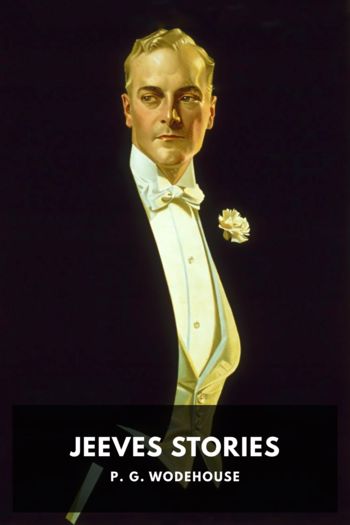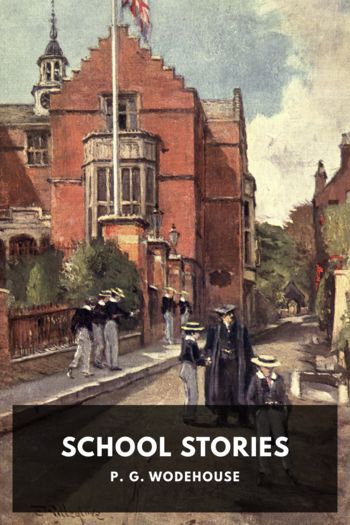Right Ho, Jeeves - P. G. Wodehouse (the top 100 crime novels of all time .TXT) 📗

- Author: P. G. Wodehouse
Book online «Right Ho, Jeeves - P. G. Wodehouse (the top 100 crime novels of all time .TXT) 📗». Author P. G. Wodehouse
I remember Jeeves saying on one occasion—I forgot how the subject had arisen—he may simply have thrown the observation out, as he does sometimes, for me to take or leave—that hell hath no fury like a woman scorned. And until tonight I had always felt that there was a lot in it. I had never scorned a woman myself, but Pongo Twistleton once scorned an aunt of his, flatly refusing to meet her son Gerald at Paddington and give him lunch and see him off to school at Waterloo, and he never heard the end of it. Letters were written, he tells me, which had to be seen to be believed. Also two very strong telegrams and a bitter picture post card with a view of the Little Chilbury War Memorial on it.
Until tonight, therefore, as I say, I had never questioned the accuracy of the statement. Scorned women first and the rest nowhere, was how it had always seemed to me.
But tonight I revised my views. If you want to know what hell can really do in the way of furies, look for the chap who has been hornswoggled into taking a long and unnecessary bicycle ride in the dark without a lamp.
Mark that word “unnecessary.” That was the part of it that really jabbed the iron into the soul. I mean, if it was a case of riding to the doctor’s to save the child with croup, or going off to the local pub to fetch supplies in the event of the cellar having run dry, no one would leap to the handlebars more readily than I. Young Lochinvar, absolutely. But this business of being put through it merely to gratify one’s personal attendant’s diseased sense of the amusing was a bit too thick, and I chafed from start to finish.
So, what I mean to say, although the providence which watches over good men saw to it that I was enabled to complete the homeward journey unscathed except in the billowy portions, removing from my path all goats, elephants, and even owls that looked like my Aunt Agatha, it was a frowning and jaundiced Bertram who finally came to anchor at the Brinkley Court front door. And when I saw a dark figure emerging from the porch to meet me, I prepared to let myself go and uncork all that was fizzing in the mind.
“Jeeves!” I said.
“It is I, Bertie.”
The voice which spoke sounded like warm treacle, and even if I had not recognized it immediately as that of the Bassett, I should have known that it did not proceed from the man I was yearning to confront. For this figure before me was wearing a simple tweed dress and had employed my first name in its remarks. And Jeeves, whatever his moral defects, would never go about in skirts calling me Bertie.
The last person, of course, whom I would have wished to meet after a long evening in the saddle, but I vouchsafed a courteous “What ho!”
There was a pause, during which I massaged the calves. Mine, of course, I mean.
“You got in, then?” I said, in allusion to the change of costume.
“Oh, yes. About a quarter of an hour after you left Jeeves went searching about and found the backdoor key on the kitchen windowsill.”
“Ha!”
“What?”
“Nothing.”
“I thought you said something.”
“No, nothing.”
And I continued to do so. For at this juncture, as had so often happened when this girl and I were closeted, the conversation once more went blue on us. The night breeze whispered, but not the Bassett. A bird twittered, but not so much as a chirp escaped Bertram. It was perfectly amazing, the way her mere presence seemed to wipe speech from my lips—and mine, for that matter, from hers. It began to look as if our married life together would be rather like twenty years among the Trappist monks.
“Seen Jeeves anywhere?” I asked, eventually coming through.
“Yes, in the dining-room.”
“The dining-room?”
“Waiting on everybody. They are having eggs and bacon and champagne. … What did you say?”
I had said nothing—merely snorted. There was something about the thought of these people carelessly revelling at a time when, for all they knew, I was probably being dragged about the countryside by goats or chewed by elephants, that struck home at me like a poisoned dart. It was the sort of thing you read about as having happened just before the French Revolution—the haughty nobles in their castles callously digging in and quaffing while the unfortunate blighters outside were suffering frightful privations.
The voice of the Bassett cut in on these mordant reflections:
“Bertie.”
“Hullo!”
Silence.
“Hullo!” I said again.
No response. Whole thing rather like one of those telephone conversations where you sit at your end of the wire saying: “Hullo! Hullo!” unaware that the party of the second part has gone off to tea.
Eventually, however, she came to the surface again:
“Bertie, I have something to say to you.”
“What?”
“I have something to say to you.”
“I know. I said ‘What?’ ”
“Oh, I thought you didn’t hear what I said.”
“Yes, I heard what you said, all right, but not what you were going to say.”
“Oh, I see.”
“Right-ho.”
So that was straightened out. Nevertheless, instead of proceeding she took time off once more. She stood twisting the fingers and scratching the gravel with her foot. When finally she spoke, it was to deliver an impressive boost:
“Bertie, do you read Tennyson?”
“Not if I can help.”
“You remind me so much of those Knights of the Round Table in the Idylls of the King.”
Of course I had heard of them—Lancelot, Galahad and all that lot, but I didn’t see where the resemblance came in. It seemed to me that she must be thinking of a couple of other fellows.
“How do you mean?”
“You have such a great heart, such a fine soul. You are so generous, so unselfish, so chivalrous. I have always felt that about you—that you are one of the few really chivalrous men I have ever met.”
Well, dashed difficult, of course, to know what to say when someone is giving





Comments (0)